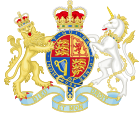- Welsh Church Act 1914
-
Welsh Church Act 1914 
Parliament of the United KingdomLong title An Act to terminate the establishment of the Church of England in Wales and Monmouthshire... Statute book chapter 1914 c. 91 Territorial extent Wales (de facto)
United Kingdom of Great Britain and Ireland (de jure)Dates Royal Assent 18 September 1914 Commencement 31 March 1920
(see Suspensory Act 1914)Other legislation Amendments - Welsh Church (Temporalities) Act 1919
- Welsh Church (Amendment) Act 1938
Related legislation - Irish Church Act 1869
- Suspensory Act 1914
Status: Amended Text of statute as originally enacted Official text of the statute as amended and in force today within the United Kingdom, from the UK Statute Law Database The Welsh Church Act 1914 is an Act of the Parliament of the United Kingdom under which the Welsh part of the Church of England was separated and disestablished, leading to the creation of the Church in Wales. The Act was a controversial measure, and was passed by the House of Commons under the provisions of the Parliament Act 1911.
The Bill was politically and historically significant as one of the first pieces of legislation to apply solely to Wales (and Monmouthshire) since the country's incorporation into the wider legal entity of the Kingdom of England.[1] In Wales the passing of the Bill was seen by many as the culmination of a long campaign which had begun in the mid-nineteenth century, led largely by Welsh Nonconformists who objected to paying tithes to the Church of England. The campaign was later strongly supported by the patriotic Cymru Fydd movement.
English author G. K. Chesterton ridiculed the passion that was generated by the Bill in his poem Antichrist, or the Reunion of Christendom: An Ode, repeatedly addressing F.E. Smith, one of the chief opponents of the act.
Owing to the outbreak of the First World War in August, the Act was given Royal Assent on 18 September simultaneously with another controversial bill, the Government of Ireland Act 1914, and the Suspensory Act 1914. The Suspensory Act stated that the two other Acts would not come into force for the remainder of the war. On 31 March 1920 the Welsh part of the Church of England became the Church in Wales, an independent province of the Anglican Communion, with six dioceses led by the Archbishop of Wales.
The Welsh Church Act and the Government of Ireland Act were (together with Parliament Act 1949) the only acts enacted by invoking the Parliament Act 1911 until 1991.
Notes
- ^ Jenkins, P. (1992) A History of Modern Wales 1536–1990. Harlow: Longman
See also
 United Kingdom legislation
United Kingdom legislationPre-Parliamentary legislation Acts of Parliament by states preceding
the Kingdom of Great BritainActs of the Parliament of England to 1483 · 1485–1601 · 1603–1641 · Interregnum (1642–1660) · 1660–1699 · 1700–1706
Acts of the Parliament of Scotland
Acts of the Parliament of Ireland to 1700 · 1701–1800Acts of Parliament of the
Kingdom of Great Britain1707–1719 · 1720–1739 · 1740–1759 · 1760–1779 · 1780–1800
Acts of Parliament of the United Kingdom of
Great Britain and Ireland and the United
Kingdom of Great Britain and Northern IrelandChurch of England Measures Legislation of devolved institutions Acts of the Scottish Parliament
Acts and Measures of the Welsh Assembly
Acts of the Northern Ireland Assembly / of the Northern Ireland Parliament
Orders in Council for Northern IrelandSecondary legislation Categories:- Wales stubs
- Anglicanism stubs
- Statute stubs
- United Kingdom law stubs
- 1914 in law
- 1914 in Wales
- United Kingdom Acts of Parliament 1914
- Anglicanism
- Christianity in Wales
- Church in Wales
- Church of England disestablishment
- Constitutional laws of Wales
- Politics of Wales
- Welsh laws
- 20th-century laws in Christianity
- History of Monmouthshire
- Church and state law
- 1914 in international relations
- Acts of the Parliament of the United Kingdom passed under the Parliament Act
- History of religion in Wales
Wikimedia Foundation. 2010.

